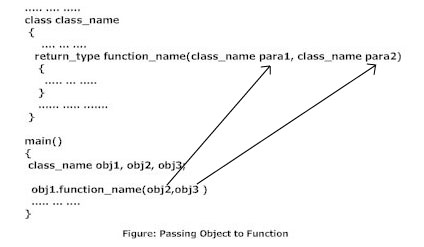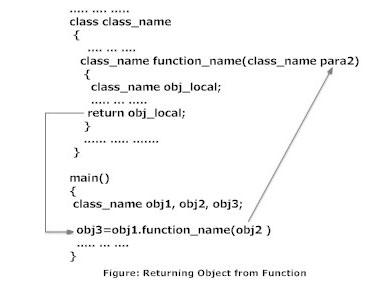In C++ programming, objects can be passed to function in similar way as variables and structures.
Procedure to Pass Object to Function

Example to Pass Object to Function
C++ program to add two complex numbers by passing objects to function.
#include <iostream>
using namespace std;
class Complex
{
private:
int real;
int imag;
public:
Complex(): real(0), imag(0) { }
void Read()
{
cout<<"Enter real and imaginary number respectively:"<<endl;
cin>>real>>imag;
}
void Add(Complex comp1,Complex comp2)
{
real=comp1.real+comp2.real;
/* Here, real represents the real data of object c3 because this function is called using code c3.add(c1,c2); */
imag=comp1.imag+comp2.imag;
/* Here, imag represents the imag data of object c3 because this function is called using code c3.add(c1,c2); */
}
void Display()
{
cout<<"Sum="<<real<<"+"<<imag<<"i";
}
};
int main()
{
Complex c1,c2,c3;
c1.Read();
c2.Read();
c3.Add(c1,c2);
c3.Display();
return 0;
}Output
Enter real and imaginary number respectively:
12
3
Enter real and imaginary number respectively:
2
6
Sum=14+9i
Returning Object from Function
The syntax and procedure to return object is similar to that of returning structure from function.

Example to Return Object from Function
This program is the modification of above program displays exactly same output as above. But, in this program, object is return from function to perform this task.
#include <iostream>
using namespace std;
class Complex
{
private:
int real;
int imag;
public:
Complex(): real(0), imag(0) { }
void Read()
{
cout<<"Enter real and imaginary number respectively:"<<endl;
cin>>real>>imag;
}
Complex Add(Complex comp2)
{
Complex temp;
temp.real=real+comp2.real;
/* Here, real represents the real data of object c1 because this function is called using code c1.Add(c2) */
temp.imag=imag+comp2.imag;
/* Here, imag represents the imag data of object c1 because this function is called using code c1.Add(c2) */
return temp;
}
void Display()
{
cout<<"Sum="<<real<<"+"<<imag<<"i";
}
};
int main()
{
Complex c1,c2,c3;
c1.Read();
c2.Read();
c3=c1.Add(c2);
c3.Display();
return 0;
}